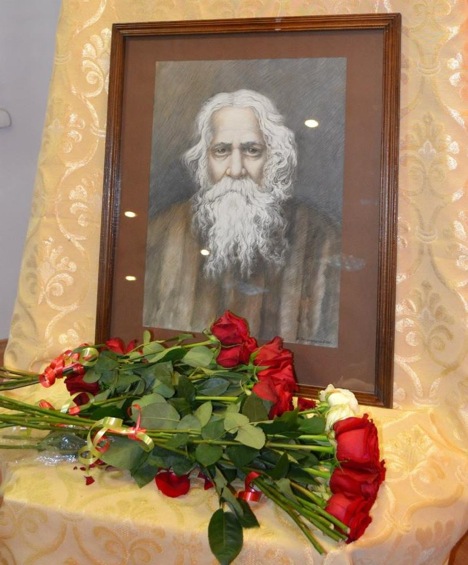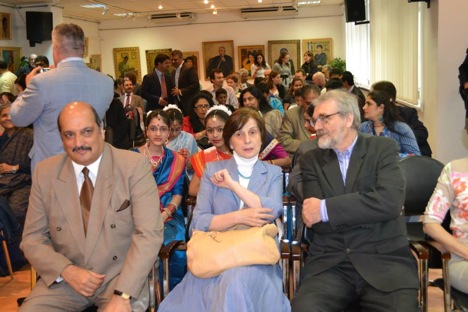Tagore “a bridge between India and Russia”

Source: Indian Embassy in Moscow
The 152nd birth anniversary of India’s great poet, writer and philosopher Rabindranath Tagore was marked at a function at the Indian Embassy in Moscow.
Russian Indologists, who are fluent in Bengali, gave eloquent speeches on Tagore’s role as global cultural icon his contribution to the Indo-Russian relationship. The evening also featured music and dance performance reflecting the diversity of India.
Indian Ambassador Ajai Malhotra began the evening by delivering a speech on Tagore in which he emphasised the immense international role of Gurudev. “If you consider many facets of the personality of Tagore, he was an Indian internationalist par excellence. Also, long time ago he had very contemporary views,” Malhotra said.
Irina Prokofieva, professor of Bengali at the Moscow Institute of International Relations, highlighted different aspects of Rabindranath Tagore’s philosophy. She devoted a lot of time in particular to Tagore’s book “Nationalism.”
To the whispers of approvals, Prokofieva’s said: “Tagore’s book ‘Nationalism’ was written at the time when the Indian nation was just shaping, and nationalism was considered a very progressive and important phenomenon in the country. But Tagore saw all the facets of that phenomenon and all the dangers that were hidden in it.”
Prokofieva drew attention to Tagore’s merit that is rarely put in the limelight. Gurudev, according to the professor was not just someone who carried Indian culture across the world but was also instrumental in bringing the Western culture of his day to India. “Tagore had that bivalence. He created the synthesis of cultures, and he didn’t divide the cultures in Western and Eastern ones,” Profofieva said. She also praised Tagore’s ability to see the bigger picture and to predict the long-term consequences of the events well before society could even begin to imagine them. She stressed that while a lot is said about Gurudev’s complex attitude towards the Swadeshi movement there was one constant core value for Tagore: humanism.
Prokofieva reminded the audience about the situation before India became independent, when there was an issue of choosing the national anthem. The anthem of Swadeshi movement was the hymn devoted to the Hindu goddess Vande Mataram. And Tagore wrote a letter to Subhas Chandra Bose saying: “Yes, we love our country but we can’t force the Muslims to stand up during the performance of the hymn devoted to our ten-handed goddess.”
Another prominent speaker, Sergey Serebryany, Russian Indologist and Doctor of Philosophy, emphasised the appreciation that Russians had for Tagore even before his fame “spread like a forest fire” after his getting the Nobel Prize in 1913. He said that the first translations of Gitanjali into Russian were made before that.

Indian Ambassador Ajai Malhotra (l), Russian Indologists Irina Prokofieva and Sergey Serebryany. Source: Indian Embassy in Moscow
“For us, Russians, Tagore is very special and important,” professor Serebryany said emphatically. “He is a kind of link, a bridge between the Indian culture and the Russian culture. And through him, through his writings Russians came to appreciate and understand India.”
Serebryany mentioned an interesting fact that six of Tagore’s books in Russian had been in Lenin’s private library. “We don’t know if he actually read them and what he thought. But the books were there,” the professor said.
At the function, besides the speeches and beautiful dance and music performances, there were recitations of different Tagore poems in Bengali and in Russian by students of Irina Prokofieva.
She spoke warmly about her students’ interest in translating Tagore’s poems saying with a smile: “Of course, my students’ poetic level doesn’t match that Anna Akhmatova and Boris Pasternak. But I can swear by accuracy and preciseness of expression because my students translated Tagore’s poems into Russian not from English but from Bengali, and also they translated the original poems.”
All rights reserved by Rossiyskaya Gazeta.
Subscribe
to our newsletter!
Get the week's best stories straight to your inbox
